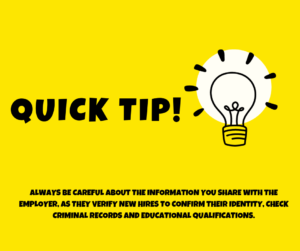Body language speaks a lot!
Do you ever wonder why some people are not able to crack the interview even after achieving excellence in academics?
Let’s imagine two scenarios!
Sharon walks into the interview room without making eye contact or just gets into the chair, keeps shaking her legs, and just looks up when the interviewer says, “Thank you for coming in today.”.
However, Angelina enters the room with full confidence, makes eye contact, uses proper hand gestures, tries to make eye contact, and tries to engage herself in small conversations.
Which candidate do you think has better chances of cracking an interview?
Of course, Angelina, right? Being said, it is essential to remember that each interview is unique and that various factors contribute to a candidate’s success. Strong academic achievements do hold significance, but in a competitive job market, the ability to effectively communicate and connect with interviewers is often equally crucial. Body language is a significant aspect of communication, and it plays a crucial role for both the interviewee and the interviewer, speaking of which in detail.
Think of a few questions, considering your last interview. Did you use contradictory statements or make eye contact with them? Did you fold your arms or shake your legs? Did you fidget?

Quick tips for Body Language
Body language reflects confidence, engagement, and interpersonal skills, all of which are highly valued in professional settings. Even the most skilled candidate might struggle to convey their abilities effectively if their body language sends contradictory messages.
Three crucial elements that significantly influence how others perceive us are:
Body Language: Non-verbal cues such as posture, gestures, eye contact, and facial expressions heavily impact how others perceive our confidence, sincerity, and engagement. These cues often speak louder than words and can either reinforce or contradict the message conveyed verbally.
Communication Style: How we articulate our thoughts, the tone of voice we use, and our ability to actively listen and respond appropriately are integral parts of communication. Clarity, empathy, and the ability to convey ideas effectively greatly influence how others perceive our competence and likability.
Personal Presentation: Our appearance, grooming, and attire create an immediate visual impression. It’s often said that first impressions are lasting impressions, and how we present ourselves visually can significantly influence the initial judgments others make about our professionalism, attention to detail, and suitability for a particular setting or role.
These elements intertwine to form an overall impression that others have of us. Mastering these aspects and ensuring they align with the message we intend to convey is key to creating a positive and impactful perception.
Wondering how to impress the hiring manager? Don’t worry; we have your back. Let’s quickly discuss a few amazing tips.
Thorough Research: Know about the company, its culture, values, and recent achievements. Showcasing this knowledge demonstrates your genuine interest and preparation.
Tailored Resume and Cover Letter: Customize your resume and cover letter to highlight experiences and skills relevant to the job description. Make it easy for the hiring manager to see how you’re a perfect fit.
Practice Interview Scenarios: Rehearse common interview questions and scenarios. Practice will help you articulate your experiences and skills confidently during the interview.
Highlight Achievements: Instead of just listing job duties, emphasize specific accomplishments and how they contributed to the company’s success. Quantify the results whenever possible.
Ask Engaging Questions: Prepare insightful questions about the role, company, or team culture. It shows your interest and critical thinking.
Show Enthusiasm: Express genuine enthusiasm for the role and the company. Positive energy can leave a lasting impression.
Professional demeanor: dress appropriately, maintain eye contact, and exhibit positive body language. It conveys professionalism and confidence.
Follow-up Email: Send a thank-you email after the interview, expressing gratitude for the opportunity and reiterating your interest in the position.
Flexibility and Adaptability: Showcase your flexibility and adaptability to different situations. Companies value candidates who can evolve with changing needs.
Be authentic! Be yourself! Authenticity helps build a genuine connection with the interviewer. How important are facial impressions?
Facial expressions play a pivotal role in how we’re perceived during an interview. They convey emotions and can significantly impact the impression we leave on the interviewer. Here’s a breakdown:
Smiles: While smiles exhibit warmth and friendliness, as you rightly mentioned, they might not always be appropriate during serious discussio ns. Use them naturally, especially during introductions and lighter moments, but be mindful of the context.
ns. Use them naturally, especially during introductions and lighter moments, but be mindful of the context.
Serious Topics: During discussions on serious or critical topics, a neutral or attentive expression might be more suitable. It’s about striking the right balance between engagement and appropriate seriousness.
Mirror Practice: Practicing facial expressions in front of a mirror can indeed be beneficial. It helps you become aware of how expressions may come across and allows you to adjust them to better suit the tone and context of the conversation.
Concerned or Thoughtful Expressions: Sometimes, expressions meant to convey concern or thoughtfulness might inadvertently appear as scowls or frowns. Mirror practice can help adjust these expressions to ensure they reflect the intended emotion without being misinterpreted.
Authenticity: While practicing expressions is helpful, it’s also important to maintain authenticity. Strive to express genuine emotions rather than forcing or overplaying facial expressions, as authenticity tends to resonate better with interviewers.
And now you are all ready to go! All the best!
